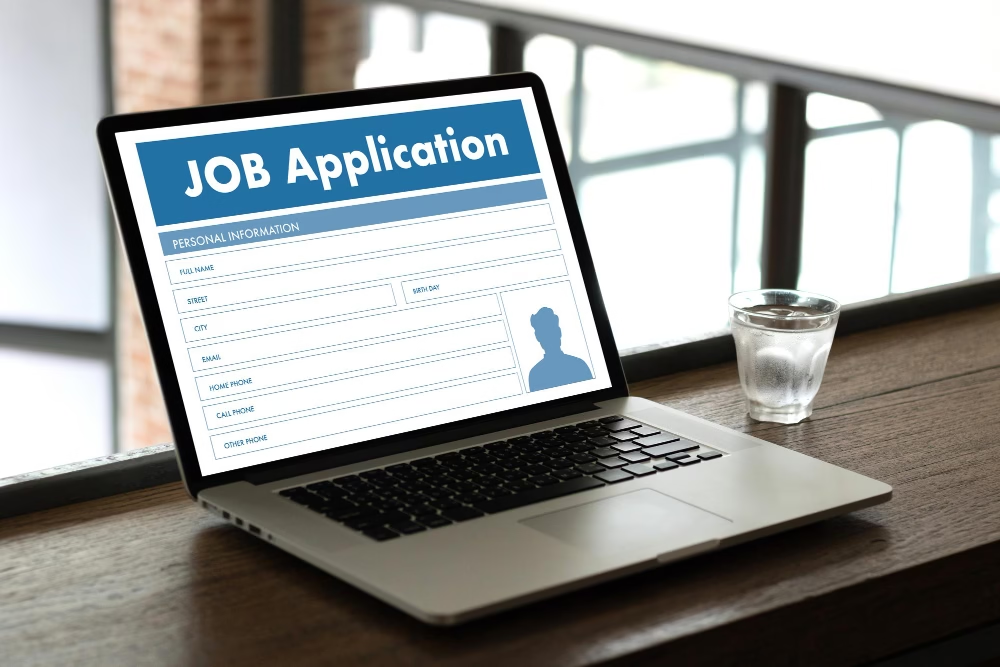
This post may contain affiliate links that at no additional cost to you, we may earn a small commission. Read the Disclosure Policy for more information.
Last Updated on November 13, 2025 by Katie
Taking a career break doesn’t mean your professional journey has ended.
Whether you stepped away for family responsibilities, health reasons, education, or personal growth, returning to the workforce requires strategic planning and preparation.
To answer the question of how to get a job after a long career break, position your time away as a period of growth while demonstrating your current value to potential employers.
Success depends on how well you can bridge your past experience with your future goals through targeted networking, skill development, and strategic job searching approaches that address potential employer concerns while highlighting your unique strengths.
To help you out, check out these best job search apps to find top remote jobs quickly.
Featured Career Opportunities!
* Get Paid to do Voiceovers from Home – FREE Mini-course Intro to Voiceovers.
* Work at Home as a Transcriptionist – Learn Transcription Skills with Transcribe Anywhere and Open Doors to New Remote Jobs.
* Start Your Own Thriving Proofreading Business – Learn how to get started in this FREE proofreading workshop.
* How to Start a Bookkeeping Business from Home – Free training series from the team at Bookkeepers.com.
Top Tips On How to Get a Job After a Long Career Break

Being out of work for a long period of time may feel scary, but by following the guidance below, you’ll find a new career path that you love.
Let’s dive in!
1: Reflect on your skills and experiences gained before and during your break
Taking time to assess your complete skill set forms the foundation of your job search strategy.
You need to examine both your pre-break professional abilities and any new competencies you developed during your time away.
The power of reflection helps you identify valuable experiences you might overlook. Your career break likely provided opportunities for growth through volunteer work, freelance projects, or online learning.
Start by listing your previous job skills, then add activities from your break period. Include parenting responsibilities, community involvement, or personal projects that required problem-solving and organisation.
Skills gained during career breaks often include time management, adaptability, and communication abilities.
These transferable skills demonstrate your continued professional development to potential employers.
2: Update your resume, emphasising recent relevant activities or learning
Your resume needs significant updates when navigating how to get a job after a long career break.
Keeping your resume current is crucial for job hunting and demonstrates your continued professional engagement. – Use these AI resume builders to help you out.
Focus on activities from your break that relate to your target role. Include online courses, certifications, volunteer work, freelance projects, or consulting assignments.
Create a dedicated section for professional development or continuing education. List specific skills you’ve acquired and how they apply to the position you want.
Remove outdated technical skills and add current ones. Replace old contact information and eliminate references to obsolete software or systems.
Update your resume regularly to showcase your growth, skills, and achievements and keep it ready for new opportunities.
3: Pursue targeted upskilling through online courses or certifications
Skills evolve rapidly during career breaks. Online courses offer flexibility and affordability to help you catch up with industry changes.
Research your target field to identify skill gaps. Look at job postings to understand what employers currently want.
Choose courses that directly address these gaps. Focus on high-demand certifications rather than general knowledge courses.
Digital upskilling platforms provide structured learning paths. Many offer completion certificates that demonstrate your commitment to professional development.
Set a realistic learning schedule. Complete one course before starting another to avoid overwhelming yourself.
4: Leverage professional networks and reconnect with former colleagues
Your existing professional network is one of your most valuable assets when returning to work.
Former colleagues, managers, and industry contacts often know about opportunities before they’re publicly advertised.
Start by researching professional networking events in your field. Many networks maintain contact throughout the years, while others have diversified or moved on.
LinkedIn provides excellent tools for rekindling professional relationships. Update your profile first, then reach out to former coworkers with personalised messages.
When reconnecting, establish clear goals for what you hope to achieve.
Be specific about whether you’re exploring opportunities, seeking mentorship, or looking for industry insights.
5: Tailor your applications to highlight your motivation and readiness

Generic applications won’t cut it after a career break. Employers need to see that you’re genuinely invested in returning to work.
Customise your resume and cover letter for each position. Address your career gap directly and explain what you learned during your time away.
Use specific examples that demonstrate your enthusiasm for the role and connect your past experiences to the job requirements, even if they happened before your break.
Research the company’s values and mission to show how your renewed perspective aligns with their goals and culture.
Write a compelling personal statement that explains why you’re ready to re-enter the workforce now.
6: Consider part-time or freelance roles to ease back into the workforce
When learning how to get a job after a long career break, part-time and contract work provides a gentler transition back to professional life.
These roles let you rebuild confidence without the pressure of full-time commitments.
You can refresh your skills gradually while establishing new work routines. Simple work-from-home jobs also help you test different industries or companies before making long-term decisions.
Start by identifying your preferred schedule and workload capacity. Search job boards specifically for part-time, contract, or temporary positions in your field.
Consider temporary-to-hire opportunities that may convert to permanent roles, as these arrangements benefit both you and employers by reducing hiring risks.
Another option is volunteer work, which offers another pathway to gain experience while contributing to causes you care about.
Further reading: 17 easy freelance jobs from home for beginners.
7: Prepare a concise and positive explanation for your career break
Having a clear explanation ready prevents awkward moments during interviews.
Employers expect gaps to be addressed, so preparation shows professionalism.
Keep your explanation brief and focused. Acknowledge the break directly without over-explaining while highlighting any growth or learning that occurred during this period.
Practice delivering your explanation in 30 seconds or less and focus on what you gained rather than what you missed professionally.
Frame your break positively by mentioning skills developed, courses taken, or volunteer work completed.
This demonstrates you remained engaged and motivated during your time away.
8: Engage with recruiters specialising in your industry
Industry-specific recruiters understand your field’s unique requirements and maintain relationships with relevant employers.
They can bridge the gap between your career break and potential opportunities.
Working with recruiters gives you access to hidden job markets that aren’t publicly advertised.
These professionals often know about upcoming positions before they’re posted online.
Start by researching recruiting firms that focus on your industry and use LinkedIn to identify recruiters who regularly post about roles in your field.
When reaching out, be transparent about your career break. Approaching recruiters effectively means being clear about your goals and making their job easier.
Prepare a concise explanation of your time away and how you’ve stayed current.
Recruiters appreciate honesty and can better position you with employers when they understand your story.
9: Showcase transferable skills applicable to new or evolving roles
Transferable skills are abilities that can be applied across different roles and industries.
When looking at how to get a job after a long career break, they bridge the gap between your past experience and future opportunities.
Focus on skills like communication, problem-solving, project management, and leadership as these abilities remain valuable regardless of industry changes during your career break.
Review job descriptions for the roles you want and identify which of your existing skills match their requirements, even if gained in different contexts.
Use specific examples and achievements to demonstrate these skills rather than simply listing them.
Furthermore, tailor your resume and cover letter to highlight the most relevant transferable skills for each application.

Volunteering bridges the gap between your career break and your target role.
You gain hands-on experience while demonstrating your commitment to potential employers.
Volunteer work acts as real-world experience, especially valuable when you have limited recent job history and it shows you’re actively developing skills rather than remaining idle.
Start by checking your local community service offices or platforms like VolunteerMatch to find relevant opportunities.
Choose positions that let you practice specific skills you’ll need in your target job.
If you want marketing roles, volunteer to manage social media for nonprofits. For project management positions, coordinate volunteer events.
List this volunteer experience prominently on your resume using bullet points to highlight key accomplishments and responsibilities.
Tips for Interviewing After Time Away from the Workforce
When searching for how to get a job after a long career break, regular interview practice will serve you well.
Preparation and authenticity are your strongest assets when getting ready for your first interviews.
Focus on addressing employment gaps honestly while highlighting the skills and experiences you maintained during your time away.
Be Prepared
Research the company thoroughly before your interview.
Review their website, recent news, and social media presence to understand their current priorities and challenges.
Practice common interview questions out loud and focus especially on explaining your career gap in a clear, confident manner.
Prepare responses like to these weird interview questions that showcase your skills and readiness to return.
Update yourself on industry trends and developments that occurred during your absence.
Read trade publications, follow industry leaders on LinkedIn, and join professional groups to catch up on changes.
Key preparation areas:
- Company research and recent developments
- Industry trends and technological changes
- Common interview questions and your responses
- Examples of relevant skills from your break period
Mock interviews help rebuild your confidence. Practice with friends, family, or career counsellors to get comfortable with the interview format again.
Be Honest

Address your employment gap directly rather than trying to hide it.
Explain your career break professionally and focus on what you learned or accomplished during that time.
Frame your break positively by highlighting any relevant activities, such as volunteering, caregiving, education, or personal projects, which can demonstrate continued growth and skill development.
Avoid making excuses or dwelling on negative aspects of your break.
Keep explanations brief and pivot quickly to your qualifications and enthusiasm for the role.
Effective ways to discuss your break:
- Volunteer work: “I volunteered with local nonprofits, developing project management skills”
- Caregiving: “I provided family care while staying current with industry trends”
- Education: “I completed online courses to enhance my technical abilities”
Be specific about dates and durations. Vague timelines create suspicion, while clear explanations build trust with potential employers.
Further reading: How to write a cover letter that gets you hired.
Be Confident
Your skills and experience remain valuable despite time away from traditional employment.
Professional abilities stay intact and can be quickly refreshed once you return to work.
Maintain strong body language throughout the interview. Sit up straight, make eye contact, and speak clearly to project confidence and professionalism.
Focus on your accomplishments and strengths rather than apologising for your career break.
Employers want to see enthusiasm and capability, not uncertainty or defensiveness.
Confidence-building strategies:
- Practice power poses before the interview
- Prepare specific examples of your achievements
- Speak about your break as a deliberate choice
- Emphasise your motivation to return
Remember that many people take career breaks for valid reasons. Your situation is more common than you might think.
Don’t Undervalue Yourself
Avoid accepting significantly lower salaries or positions beneath your qualifications simply because of your employment gap.
Research current market rates for your role and experience level and negotiate based on your full experience and skills, not just your recent work history.
Your pre-break accomplishments and any relevant activities during your absence contribute to your overall value.
Salary negotiation considerations:
- Research current market rates for your position
- Factor in your total years of experience
- Consider the value of skills gained during your break
- Don’t accept the first offer without discussion
Present yourself as someone choosing to return to work, not someone desperate for any opportunity. This mindset shift affects how employers perceive your worth and negotiate with you.
Further reading: 15 common job search mistakes and how to avoid them.
Cultivating a Growth Mindset for Career Success
Returning to work after an extended break requires shifting from self-limiting beliefs to embracing your ability to learn and adapt.
Research demonstrates that professionals with a growth mindset achieve 40% higher career advancement rates compared to their peers.
Overcoming Self-Doubt
Self-doubt often stems from comparing your current skills to where you left off years ago.
Your brain has remained active during your break, even if not in a traditional work environment.
Challenge negative self-talk by writing down specific fears about your abilities. Next to each fear, list three pieces of evidence that contradict it.
Replace “I’m behind everyone else” with “I bring unique perspectives from my experiences.”
Your break likely provided you with problem-solving skills, adaptability, and insights that continuously working professionals may lack.
Practice the 5-minute rule: When facing a challenging task, commit to working on it for just five minutes.
This approach helps build momentum and proves to yourself that you can tackle difficult situations.

Building Confidence After a Break
Confidence rebuilds through small, consistent actions rather than waiting for a sudden breakthrough.
Start by identifying three skills you maintained or developed during your career break.
Document your wins in a daily journal. Include problem-solving moments, new technologies you learned, or interpersonal challenges you navigated successfully.
Set micro-goals that you can achieve within one week. Examples include completing an online course module, reaching out to one professional contact, or updating one section of your resume.
Seek feedback actively from trusted friends or family about your strengths.
External perspectives often reveal capabilities you’ve overlooked or undervalued.
Embracing challenges and learning from setbacks becomes easier when you view each application, interview, or networking conversation as data collection rather than a pass-or-fail situation.
Further reading: 20 proven job search tips for quick success.
Final Thoughts on How to Get a Job After a Long Career Break
Those are my best tips for how to get a job after a long career break!
As you can imagine, returning to work after an extended break requires preparation and persistence.
However, it’s not impossible and the job market has opportunities for professionals at every career stage, like these ideal careers for people over 50.
Focus on your strengths rather than dwelling on the gap and you will often find that employers value diverse experiences and fresh perspectives that career breaks provide.
Having trouble finding your dream remote career?
Check this guide on how to use ChatGPT to find a job you love.
Summary

How to Get a Job After a Long Career Break
Description
How to Get a Job After a Long Career Break.
Author
Katie Lamb
Remote Work Rebels
Publisher Logo
remoteworkrebels.com (Article Sourced Website)
#Job #Long #Career #Break
